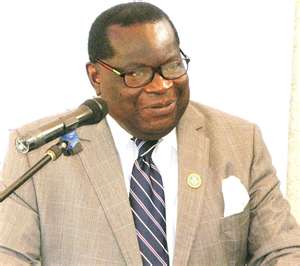Malawi’s Minister of Economic Planning and Development Goodall Gondwe says the Economic Recovery Plan (ERP) is on course, saying most economic indicators under recovery plan are working as planned.
Gondwe, in an interview with Business News at the weekend, said the foreign exchange black market has been eliminated and that forex is now available on the formal market.
“With regards to the plan, I would say two main things have been achieved. The black market is about to be eliminated and, instead of foreign exchange going to the black market, it is now going to [commercial banks],” he said.
Last September, government launched ERP which outlined a set of immediate, short and medium term policy reforms aimed at restoring the external and internal economic stability.
Immediate policy reforms have a timeframe of three months while short and medium term policy reforms have a timeframe of one year and two to five years, respectively, before the anticipated economic stability comes into play.
“So, we are in the first part of recovery and it is doing well. Better than it was expected. The second one, of course, it will take time because it requires that we register growth in a number of sectors and improve energy sector.
“I think this year, we will see a number of tangible results and within the next three years, we should be comfortably on our way not only to recovery, but also register high economic growth rate as before,” said Gondwe.
Under the ERP, the Ministry of Economic Planning and Development has been mandated to provide strategic direction for the economy while the Office of the President and Cabinet (OPC) will provide oversight and supervisory roles to ensure that the plan is effectively implemented.
Gondwe, who was Finance Minister when the Malawi Government maintained stable macroeconomic indicators during the late president Bingu wa Mutharika regime, said government is eager to stabilise the exchange rate, lower the prevailing high interest rates and also abolish the foreign exchange black market, which, he said, are key to attract more investors.
The minister expects the inflation rate, currently at 33.3 percent as of November 2012, to come down in the first quarter of 2013.
“You need a macroeconomic environment that is stable and sound and we have set a number of policies to ensure this. The first tool was the devaluation of the kwacha and its subsequent flotation,” said Gondwe.
Soon after assuming the reins of power, the Joyce Banda administration devalued the kwacha in May and adopted a liberal foreign exchange regime as part of economic reform package.
Gondwe said the devaluation of the kwacha was done so that the price of the foreign currency should reflect the relative price of a unit of a foreign currency.
He also said the weakening of the currency was done to improve the competitiveness of the domestic economy by boosting the country’s export base.
Finance Minister Dr. Ken Lipenga in a recent interview noted that Malawi’s parallel foreign exchange market has collapsed as premiums over official rate have fallen to as low as five percent.

